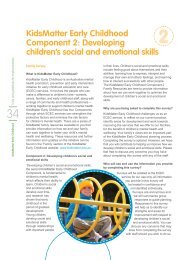Understanding mental health in early childhood [9MB] - KidsMatter
Understanding mental health in early childhood [9MB] - KidsMatter
Understanding mental health in early childhood [9MB] - KidsMatter
Create successful ePaper yourself
Turn your PDF publications into a flip-book with our unique Google optimized e-Paper software.
<strong>Understand<strong>in</strong>g</strong> <strong>mental</strong> <strong>health</strong><br />
<strong>in</strong> <strong>early</strong> <strong>childhood</strong><br />
What is <strong>mental</strong> <strong>health</strong><br />
<strong>in</strong> <strong>early</strong> <strong>childhood</strong>?<br />
Early <strong>childhood</strong> <strong>mental</strong> <strong>health</strong> has<br />
been def<strong>in</strong>ed as a young child’s<br />
ability to ‘experience, regulate and<br />
express emotions; form close and<br />
secure <strong>in</strong>terpersonal relationships;<br />
and explore the environment<br />
and learn—all <strong>in</strong> the context of<br />
family, community and cultural<br />
expectations for young children.<br />
Infant <strong>mental</strong> <strong>health</strong> is synonymous<br />
with <strong>health</strong>y social and emotional<br />
development.’ (Zero to Three, 2002).<br />
Gett<strong>in</strong>g <strong>in</strong> <strong>early</strong> for children’s <strong>mental</strong> <strong>health</strong><br />
Keep<strong>in</strong>g children <strong>health</strong>y and happy <strong>in</strong>volves look<strong>in</strong>g after their<br />
<strong>mental</strong> <strong>health</strong> as well as their physical <strong>health</strong>. Mental <strong>health</strong> is<br />
about hav<strong>in</strong>g a <strong>health</strong>y m<strong>in</strong>d and body, and <strong>in</strong>fluences how we<br />
feel about ourselves, what we do, how we th<strong>in</strong>k, and how we<br />
relate to others. Good <strong>mental</strong> <strong>health</strong> helps us to form positive<br />
relationships with others, handle ups and downs and generally<br />
enjoy life. With good <strong>mental</strong> <strong>health</strong>, children can feel good<br />
about themselves and be more open to try<strong>in</strong>g and learn<strong>in</strong>g<br />
new th<strong>in</strong>gs. Good <strong>mental</strong> <strong>health</strong> <strong>in</strong> <strong>early</strong> <strong>childhood</strong> lays the<br />
foundations for positive <strong>mental</strong> <strong>health</strong> and wellbe<strong>in</strong>g now and<br />
<strong>in</strong>to the future.<br />
Information for <strong>early</strong> <strong>childhood</strong> staff and families Component 4 – Help<strong>in</strong>g children who are experienc<strong>in</strong>g <strong>mental</strong> <strong>health</strong> difficulties
Mental <strong>health</strong> difficulties<br />
<strong>in</strong> <strong>early</strong> <strong>childhood</strong><br />
Mental <strong>health</strong> difficulties affect<br />
children’s behaviour, feel<strong>in</strong>gs,<br />
learn<strong>in</strong>g, relationships with others,<br />
as well as their physical <strong>health</strong><br />
and wellbe<strong>in</strong>g. There are many<br />
ways that parents, carers and<br />
staff can support children who<br />
are experienc<strong>in</strong>g <strong>mental</strong> <strong>health</strong><br />
difficulties. Some of these may be<br />
parents, carers and staff work<strong>in</strong>g<br />
<strong>in</strong> partnership to come up with<br />
ways of support<strong>in</strong>g the child,<br />
attend<strong>in</strong>g <strong>in</strong>formation sessions on<br />
particular <strong>childhood</strong> <strong>mental</strong> <strong>health</strong><br />
difficulties or gett<strong>in</strong>g a referral to a<br />
<strong>mental</strong> <strong>health</strong> professional. While<br />
there are many effective supports<br />
for children experienc<strong>in</strong>g <strong>mental</strong><br />
<strong>health</strong> difficulties, many children<br />
do not receive the help they need.<br />
This can happen because families<br />
are unsure of whether their child<br />
has a difficulty, or they do not<br />
know where to go or what to do<br />
to get <strong>mental</strong> <strong>health</strong> support.<br />
Early <strong>childhood</strong> services can be<br />
ideal places for families to access<br />
<strong>in</strong>formation about support<strong>in</strong>g the<br />
<strong>mental</strong> <strong>health</strong> and wellbe<strong>in</strong>g of<br />
their children.<br />
What causes children’s <strong>mental</strong> <strong>health</strong><br />
difficulties?<br />
Unlike some medical conditions that have a direct cause (for<br />
example, a virus causes the flu), <strong>mental</strong> <strong>health</strong> difficulties<br />
are caused by multiple factors that <strong>in</strong>teract <strong>in</strong> different<br />
ways depend<strong>in</strong>g on the <strong>in</strong>dividual child, family and social<br />
circumstances.<br />
Biological, psychological and social factors all <strong>in</strong>fluence<br />
children’s <strong>mental</strong> <strong>health</strong>. Any one of these factors can have<br />
either a positive or negative <strong>in</strong>fluence on a child’s <strong>mental</strong><br />
<strong>health</strong>. For example, high self-esteem might impact on<br />
confidence; positive family relationships could help a child<br />
adjust to change.<br />
Good <strong>mental</strong> <strong>health</strong> <strong>in</strong><br />
<strong>early</strong> <strong>childhood</strong> lays<br />
the foundations for<br />
positive <strong>mental</strong> <strong>health</strong><br />
and wellbe<strong>in</strong>g now and<br />
<strong>in</strong>to the future.<br />
<strong>KidsMatter</strong> Early Childhood – www.kidsmatter.edu.au
Parents and carers can work with <strong>early</strong><br />
<strong>childhood</strong> services to support children<br />
experienc<strong>in</strong>g <strong>mental</strong> <strong>health</strong> difficulties by:<br />
ff<br />
Shar<strong>in</strong>g discussions with staff and other families about<br />
topics related to <strong>mental</strong> <strong>health</strong>, <strong>in</strong> order to <strong>in</strong>crease<br />
understand<strong>in</strong>g and reduce stereotypes.<br />
ff<br />
Hav<strong>in</strong>g frequent face-to-face contact with staff to ask<br />
questions and discuss how your child is go<strong>in</strong>g at the service.<br />
ff<br />
Read<strong>in</strong>g <strong>mental</strong> <strong>health</strong> resources that are offered at your<br />
<strong>early</strong> <strong>childhood</strong> service.<br />
ff<br />
Meet<strong>in</strong>g and talk<strong>in</strong>g with staff about particular th<strong>in</strong>gs your<br />
child may be go<strong>in</strong>g through, (for example, concerns about<br />
how they are behav<strong>in</strong>g, or changes at home that may be<br />
<strong>in</strong>fluenc<strong>in</strong>g their behaviour).<br />
ff<br />
Follow<strong>in</strong>g up on what you have discussed with staff to see<br />
how your child is go<strong>in</strong>g at the service.<br />
ff<br />
F<strong>in</strong>d<strong>in</strong>g out what local <strong>mental</strong> <strong>health</strong> support services are<br />
available <strong>in</strong> your community.<br />
ff<br />
Attend<strong>in</strong>g <strong>in</strong>formation sessions on particular topics related to<br />
children’s <strong>mental</strong> <strong>health</strong>.<br />
ff<br />
Access<strong>in</strong>g <strong>mental</strong> <strong>health</strong> <strong>in</strong>formation from quality sources<br />
(for example, books, <strong>in</strong>ternet sites, <strong>mental</strong> <strong>health</strong><br />
organisations, maternal child and <strong>health</strong> centres).<br />
ff<br />
Go<strong>in</strong>g to parent<strong>in</strong>g and family support groups and shar<strong>in</strong>g<br />
useful strategies you have learnt about respond<strong>in</strong>g to your<br />
child with the <strong>early</strong> <strong>childhood</strong> service.<br />
Information for <strong>early</strong> <strong>childhood</strong> staff and families Component 4 – Help<strong>in</strong>g children who are experienc<strong>in</strong>g <strong>mental</strong> <strong>health</strong> difficulties
What <strong>early</strong> <strong>childhood</strong><br />
services might also be<br />
do<strong>in</strong>g<br />
Early <strong>childhood</strong> services may be<br />
work<strong>in</strong>g with, and support<strong>in</strong>g<br />
children and families experienc<strong>in</strong>g<br />
<strong>mental</strong> <strong>health</strong> difficulties <strong>in</strong> a<br />
number of ways, <strong>in</strong>clud<strong>in</strong>g:<br />
ff<br />
Learn<strong>in</strong>g about <strong>mental</strong> <strong>health</strong><br />
<strong>in</strong> <strong>early</strong> <strong>childhood</strong> and shar<strong>in</strong>g<br />
understand<strong>in</strong>gs with families<br />
and other members of the <strong>early</strong><br />
<strong>childhood</strong> service community<br />
ff<br />
Obta<strong>in</strong><strong>in</strong>g <strong>mental</strong> <strong>health</strong><br />
resources for parents and carers<br />
to access<br />
ff<br />
Hav<strong>in</strong>g <strong>in</strong>formation related<br />
to children’s <strong>mental</strong> <strong>health</strong><br />
available at the service (for<br />
example, <strong>in</strong>formation sheets,<br />
pamphlets, books)<br />
ff<br />
Arrang<strong>in</strong>g guest speakers to<br />
conduct <strong>in</strong>formation sessions<br />
about children’s <strong>mental</strong> <strong>health</strong><br />
at the service.<br />
Keep<strong>in</strong>g children<br />
<strong>health</strong>y and happy<br />
<strong>in</strong>volves look<strong>in</strong>g after<br />
their <strong>mental</strong> <strong>health</strong> as<br />
well as their physical<br />
<strong>health</strong>.<br />
Where can I learn more?<br />
Articles on a range of issues relevant to understand<strong>in</strong>g <strong>early</strong> <strong>childhood</strong><br />
<strong>mental</strong> <strong>health</strong> are available at:<br />
www.cyh.com – see ‘Parent<strong>in</strong>g and child <strong>health</strong>’<br />
www.kidscount.com.au – see ‘<strong>Understand<strong>in</strong>g</strong> children’s experiences’ and<br />
‘Respond<strong>in</strong>g to children’<br />
www.himh.org.au – see ‘Current projects – Foundations’ tab<br />
Thisfresourcefandffurtherf<strong>in</strong>formationfonfthefnationalf<strong>KidsMatter</strong>fEarlyfChildhoodf<strong>in</strong>itiativefisfavailableftofdownloadfatfwww.kidsmatter.edu.au.f<br />
Thefteamfatf<strong>KidsMatter</strong>fEarlyfChildhoodfalsofwelcomesfyourffeedbackfwhichfcanfbefsubmittedfthroughfthefwebsite.<br />
The <strong>KidsMatter</strong> Early Childhood <strong>in</strong>formation sheets are resources that have been developed <strong>in</strong> collaboration and with fund<strong>in</strong>g from the Australian Government Department of<br />
Health and Age<strong>in</strong>g. While every care has been taken <strong>in</strong> prepar<strong>in</strong>g this publication, the Commonwealth does not accept liability for any <strong>in</strong>jury or loss or damage aris<strong>in</strong>g from the<br />
use of, or reliance upon, the content of this publication.<br />
<strong>KidsMatter</strong> Early Childhood – www.kidsmatter.edu.au


![Understanding mental health in early childhood [9MB] - KidsMatter](https://img.yumpu.com/38050800/1/500x640/understanding-mental-health-in-early-childhood-9mb-kidsmatter.jpg)
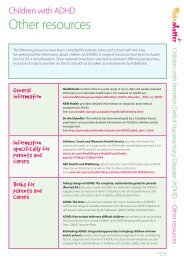
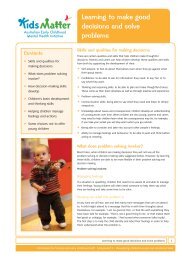
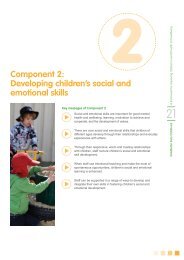
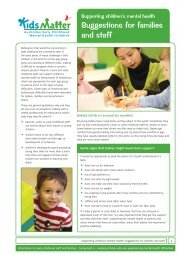

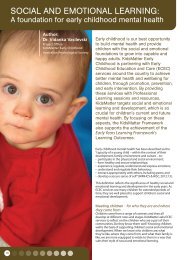
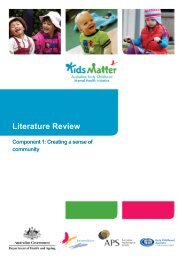
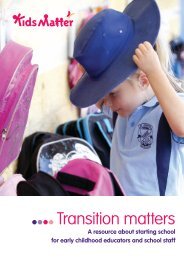
![Trinity Anglican School - Cairns story [378KB]pdf - KidsMatter](https://img.yumpu.com/41716076/1/184x260/trinity-anglican-school-cairns-story-378kbpdf-kidsmatter.jpg?quality=85)
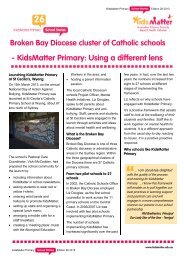
![Happy families work together [327KB] PDF - KidsMatter](https://img.yumpu.com/40767384/1/184x260/happy-families-work-together-327kb-pdf-kidsmatter.jpg?quality=85)
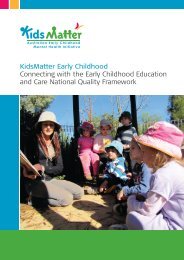
![Action Team Handbook 2012 [1.9M] [PDF] - KidsMatter](https://img.yumpu.com/38050920/1/184x260/action-team-handbook-2012-19m-pdf-kidsmatter.jpg?quality=85)
![[1008KB]pdf - KidsMatter](https://img.yumpu.com/38050895/1/184x260/1008kbpdf-kidsmatter.jpg?quality=85)
